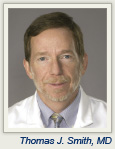The interview with Thomas J. Smith, MD (The ASCO Post, April 15, 2012), the lead author of the ASCO Palliative Care Provisional Clinical Opinion, was timely. However, it left many clinical terms and issues unclear.
A significant percentage of modern medicine, including cancer care, is palliative. Cancer is often a chronic disease, as many patients are not cured but live with cancer after we minimize the tumor burden and relieve the symptoms caused by the disease. In that sense, palliative care is part and parcel of good patient care.
What is generally understood from the words “palliative care” is symptom management. Every illness—particularly the serious ones like a heart attack or cancer—is accompanied by a host of physical, psychosocial, spiritual, financial, and emotional symptoms, which need to be relieved if one is to “heal” the patient and not just “cure” or “stabilize” the illness. Thus, “palliation” should begin at the moment the illness is diagnosed. The palliation in this context is not “end-of-life care,” although palliation does play a major role in the end-of-life setting.
The establishment of “palliative care” as a specialty has become necessary only because of fragmentation of medical care into subspecialization, time constraints, reimbursement issues, and a shift away from the primary and family care models.
Dr. Smith is quoted as saying that “palliative care is all about honoring people’s choices.” That is true in principle, but most people do not know what choices to make since they have not had this conversation with their physicians and their loved ones. Dr. Smith points to the Cancer Care Outcomes Research and Surveillance Consortium (CanCORS) study, which showed that 60 % of oncologists (let alone primary care physicians) do not have such discussions with their patients.
Hospice is truly the end-of-life care where palliation plays a major role.
I would ask the ASCO panel to consider renaming palliative care, instead using a term such as symptom management or an abbreviation such as SYMCARE. For example, the discharge summary could state that the patient was treated successfully for myocardial infarction and all of the SYMCARE issues were properly addressed. This model of care should be integrated into the care of every patient with any serious (and particularly, life-threatening) illness.
This type of care should not be palliative in the sense that it cannot be aggressive. Symptom management should be as aggressive as the primary treatment for the given illness. If the treating physician is unable to fulfill that role, then another physician and/or a team of professionals with specific expertise in symptom management should be called in for consultation.
Hospice care should continue to be defined as care of those who have 6 months or less to live. If, in that setting, a short course of radiation therapy (eg, 1 fraction rather than 10 fractions) or chemotherapy, a course of antibiotics, or a blood transfusion is deemed necessary to decrease symptoms and improve quality of life, then it should be covered by insurance.
To talk about advance directives when someone is sick and/or is being hospitalized is precisely the worst time to do so. The core principle of advance directives is self-autonomy and the right to make personal choices in health care. The issues of death and dying are frightening and should be relegated to footnotes in such discussions.
I believe that education about advance directives should begin in high schools, as teenagers become young adults, when they are healthy and in the prime of their lives. The concept should be reinforced repeatedly in community settings such as churches, synagogues, mosques, community centers, PTA meetings, and so forth. ■
—Khalid L. Rehman, MD, FACP
New York Medical College
Valhalla, New York

 ASCO has released a provisional clinical opinion (PCO) addressing the integration of palliative care services into standard oncology care.1 The ASCO Post recently spoke with one of the PCO’s lead authors, Thomas J. Smith, MD, Director of Palliative Care for Johns Hopkins Medicine and the Johns...
ASCO has released a provisional clinical opinion (PCO) addressing the integration of palliative care services into standard oncology care.1 The ASCO Post recently spoke with one of the PCO’s lead authors, Thomas J. Smith, MD, Director of Palliative Care for Johns Hopkins Medicine and the Johns...